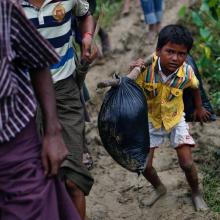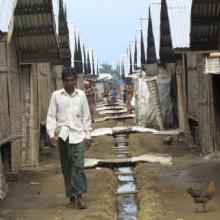Rohingya
Interestingly, the ambit of 'flashbulb memory' provides insight into cases where courts have failed to prosecute crimes of sexual violence — those hearings took place years after the actual event. In those years, memories we thought to be foolproof had deteriorated as survivors battled trauma, tragedy, and time. As testimonies were vetted for reliability, misconceptions around memory articulated through each step of the legal processn and increased the probability of a miscarriage of justice.
U.N. human rights officials have said Myanmar’s security forces may be guilty of genocide against the Rohingya Muslim minority. Since August, more than 600,000 Rohingya have fled to neighbouring Bangladesh since Myanmar began systematically targeting Rohingya armed groups.
The Reuters report drew on interviews with Buddhists who confessed to torching Rohingya homes, burying bodies, and killing Muslims in what they said was a frenzy of violence triggered when Rohingya insurgents attacked security posts last August.
The account marked the first time soldiers and paramilitary police have been implicated by testimony from security personnel in arson and killings in the north of Rakhine state that the United Nations has said may amount to genocide.
The international community is demanding that the Rohingya be allowed to go home in safety, and Bangladesh and Myanmar have begun talks on repatriation, but huge doubts remain about the Rohingya ever being able to return in peace to rebuild their homes and till their fields.
The refugees drowned in heavy seas off Bangladesh late on Thursday, part of a new surge of people fleeing a Myanmar military campaign that began on Aug. 25 and has triggered an exodus of some 502,000 people.
Myanmar regards the Rohingya as illegal immigrants from Bangladesh and bouts of suppression and violence have flared for decades. Most Rohingya are stateless.
1. The Juggalo March Is Not a Joke
"What's unique about Juggalos is that they embrace and throw their class status in everyone's face—they’re flaunting their own disenfranchisement. ...They've recognized that the American dream is unattainable and made new dreams for themselves. That scares people. That scares the FBI. This is not what poor people are supposed to do."
Today, the Rohingya are the single largest “stateless” community in the world. Their “statelessness” or lack of citizenship increases their vulnerability because they are not entitled to any legal protection from the government.
The Myanmar military response has sent more than 410,000 Rohingya Muslims fleeing to Bangladesh, escaping what they and rights monitors say is a campaign aimed at driving out the Muslim population.
4. Houston Flooding Always Hits Poor, Non-White Neighborhoods Hardest
“You’re talking about a perfect storm of pollution, environmental racism, and health risks that are probably not going to be measured and assessed until decades later.”
A U.N. report issued last month, based on interviews with 220 Rohingya among 75,000 who have fled to Bangladesh since October, said that Myanmar's security forces have committed mass killings and gang rapes of Rohingya in a campaign that "very likely" amounts to crimes against humanity and possibly ethnic cleansing.
With his anti-Muslim rhetoric and planned travel bans, you’d think President Trump would be a favorite target for Islamic State’s propaganda. The jihadist caliphate in Syria and Iraq must be pulling out all the stops to slam him as the epitome of Islamophobia.
Well, think again. The extremist group that Trump vows to “totally obliterate” has hardly printed or broadcast a word about him since before the November election. The caliphate’s Ministry of Media acts almost as if he didn’t exist.
Pope Francis has called for prayers for the Rohingya, the Muslim minority group forced to flee violence and persecution in Myanmar.

Image via Aizuddin Saad
Although they have lived in the country of Myanmar for generations, the country refuses to see them as citizens. They are often seen as intruders from Bangladesh. Treatment of the group varies from violent to genocidal with many, including The Aleteia, claiming that the Myanmar government is practicing a form of ethnic cleansing.
Pwint Phyu Latt is a Muslim peace activist in Burma who sought to promote interfaith relations with Buddhists, the nation’s religious majority. She was sentenced this year to two years in prison and two more years of hard labor.
Gulmira Imin is a Uighur Muslim in China who led the 2009 Uighur protests against its communist government. She has been in prison ever since.
Hundreds of thousands of Rohingya Muslims live in squalor in Myanmar’s western Rakhine State. That number has been falling fast as thousands flee by land and sea in search of better lives and basic survival. Here’s a look at who the Rohingyas are and why they’re leaving Myanmar in droves.
At the end of a three-day tour, the Saudi-based Organization of Islamic Cooperation told Buddhist-majority Myanmar to repeal “laws restricting fundamental freedoms” after more than 240 Muslims were killed by Buddhist mobs during the past year.
Before the OIC delegates left Myanmar on Saturday, they visited minority ethnic Rohingya Muslims who fled the violence and are now living in squalid camps along the border with Bangladesh in Myanmar’s Arakan state, also known as Rakhine.
Headed by Secretary General Ekmeleddin Ihsanoglu, the OIC delegation called on the government to continue legal reforms, The New Light of Myanmar newspaper reported.













